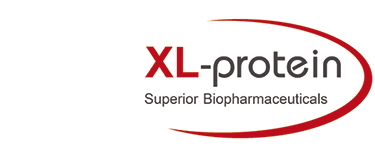Akari Therapeutics Plc and XL-protein GmbH Sign License Agreement to Develop a Long Acting Version of Coversin Using PASylation® Technology
NEW YORK, LONDON, and FREISING, Germany, April 14, 2016 – Akari Therapeutics (NASDAQ: AKTX), an emerging growth, development-stage biopharmaceutical company, and XL-protein, a privately owned biopharmaceutical company, announced today that they have entered into a License, Development and Commercialization Agreement. This partnership is focused on developing a second generation, longer acting version of Coversin.
Under this collaboration agreement, XL-protein will apply its proprietary PASylation® technology for drug half-life extension to Coversin. Coversin is a second-generation complement inhibitor that acts on complement component-C5, preventing release of C5a and formation of C5b-9 (also known as the membrane attack complex or MAC).
XL-protein has previously demonstrated that it can manufacture recombinant PASylated Coversin. An initial study conducted in a mouse model indicates that PASylated Coversin administered by subcutaneous injection remains fully active, with the high C5 binding activity of Coversin retained. In this study, it was found that PASylation of Coversin extended the plasma half-life by over 50 fold.
“XL-protein’s PASylation technology provides an elegant approach to extending the half-life of Coversin, which we hope to demonstrate in future studies will reduce the frequency of dosing,” said Miles Nunn, Chief Scientific Officer of Akari Therapeutics. “Our current plan is to investigate the relative performance of PASylated Coversin, administered by the subcutaneous route, in animal models of disease. If successful, we expect to progress PASylated Coversin to the clinic.””
“We are delighted to enter into the partnership with Akari Therapeutics; the data from the initial study indicate that PASylation could lead to a longer acting, less frequently dosed, subcutaneous version of Coversin”, commented Claus Schalper, Chief Executive Officer of XL-protein. “XL-protein successfully continues to add collaborations with renowned partners that can leverage our best-in-class half-life extension technology.”
Under the terms of the agreement, XL-protein will receive an upfront payment as well as payments for achievement of preclinical, clinical, regulatory and commercial milestones. Furthermore, XL-protein will receive royalties on sales from marketed compounds resulting from the collaboration. Further financial terms have not been disclosed.
About XL-protein GmbH:
XL-protein is a German biotech company commercializing the ground-breaking PASylation® technology, which enables the design of biopharmaceuticals with extended plasma half-life and enhanced action. With its strong proprietary technology position XL-protein focuses at the preclinical as well as clinical development of PASylated proteins in various disease areas. The company is located at Freising, Germany, in the neighbourhoods of Munich International Airport and the Technical University of Munich.
(www.xl-protein.com)
About Akari Therapeutics Plc:
Akari is a clinical-stage biopharmaceutical company focused on the development and commercialization of innovative therapeutics to treat orphan autoimmune and inflammatory diseases. Akari’s lead drug, Coversin is a second-generation complement inhibitor that acts on complement component-C5, preventing release of C5a and formation of C5b-9 (also known as the membrane attack complex or MAC). C5 inhibition is growing in importance in a range of rare autoimmune diseases related to dysregulation of the complement component of the immune system, including Paroxysmal Nocturnal Hemoglobinuria (PNH), atypical Hemolytic Uremic Syndrome (aHUS), and Guillain Barré syndrome (GBS).
(www.akaritx.com)

